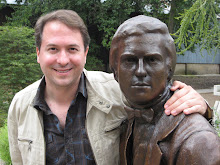Day Two
Tuesday afternoon, July 7th
Here’s a summary of the afternoon session on Changing Views of Evolution:
Greg Radick – talked about Darwin’s development of natural selection in relation to artificial selection. He then ran through four major criticisms of the term “natural selection” at the time and how Darwin responded to them.
Hanna Kokko – Covered my personal favorite evolutionary topic of sexual selection (I did my Ph.D. on the role of sexual selection in the speciation of fireflies) but only in a rather general overview. I don’t think she did such a good job at explaining the interest and fascination inherent in the theory. I can only remember one interesting example that she used (there are SO many!) of the Xiphophorus, the genus of swordtail fishes, that can have a spot on their tail which makes them sexy to females. Unfortunately if they get a black cancerous growth on their tail, then that is still seen as sexy by the female and so sexual selection can actually spread the growth of cancer in this genus!
Peter Grant – If you know anything about evolution, you’ve most likely heard of Rosemary and Peter Grant and their three decades of work on Darwin’s Finches in the Galapagos Islands. Peter talked about how divergent selection on feeding has lead to speciation in Darwin’s finches. He also told of a finch behaviour I’ve never heard of before (I’ve seen him speak twice recently here in Vancouver) which is small beaked finches showing a “parasitic” behaviour of stealing seeds from big-beaked finches once they have cracked open hard to open seeds.
Kevin Laland – Talked about niche construction, which is when organisms modify their environment, changing their ecological niche. Think beaver dams or bower birds. He pointed out that the modeling he and his collaborators have done have turned up some interesting features of this phenomenon, such as how populations can continue to evolve even after selection has stopped because of the influence of their niche construction.
Konstantin Anokhin – To be honest I’m not quite sure what this talk was about. He had a rather thick Russian accent and was talking about the genetic assimilation of learning. Something about how physiology and neuroscience will benefit greatly from applying principals from evolutionary biology. It was very hard to follow.
Eva Jablonka – Gave a very cool and rather impassioned talk on Epigenetic Inheritance in evolution. That is the transmission of phenotypic variation though means other than DNA inheritance. Examples include transposable elements in maize, temperature induced changes in peas. The best understood examples seem to have to do with DNA methylation patterns. A very interesting, but not yet fully understood area of evolution.
Scott Gilbert – This was my favorite talk of this afternoon session (mainly because I was already familiar with Peter Grant’s research) dealing with Developmental Symbiosis and phenotype combination (“It’s not just lichen any more folks!”). The upshot is that humans, and many other or possibly species, develop and evolve not as singular organisms, but as whole communities of organisms. The best known examples are symbiotic fungi (eg. mycorrhizal) and bacteria (eg. gut bacteria or insect Wolbachia symbionts).

The Eagle Pub
That evening we had dinner at The Eagle Pub, where
James Watson and
Francis Crick used to eat 6 nights a week while unraveling the structure of DNA. Supposedly when the finally figured it out, they went to the Eagle and announced “We’ve just discovered the secret to life!” and wanted to buy a round of drinks for the house, but they were unable to because they had already run up such a huge tab!

We also went to go see
Baba Brinkman’s The Rap Guide to Evolution, which was amazing. He had a very keen audience of about 80 or so in a really cool teaching room in the Anthropology department, the whole back wall was lined with the skulls of human ancestors, genetic abnormalities and the subjects of trepanation! Baba did another great performance and was really excited to have
David Sloan Wilson (Darwin’s Cathedral and Evolution for Everyone) in the audience, a major proponent of multi-level selection, which Baba spends an entire section of his performance on. After the show a bunch of us joined Baba for drinks at The Eagle and a great time was had by all.

Me enjoying a pint at the Eagle Pub

Angie, Me and Baba at the Eagle, sitting at Watson and Crick's table
Tomorrow: Human Nature and Belief (where I will explain why Dan Dennett compares God to an air-guitarist and why that’s “lame”)
 The College grounds
The College grounds A list of the students and their rooms (as they existed in about 1828)
A list of the students and their rooms (as they existed in about 1828) The restoration process of the room as it looked in early 2009,
The restoration process of the room as it looked in early 2009, Earlier I posted a picture of myself with this newly created
Earlier I posted a picture of myself with this newly created

































